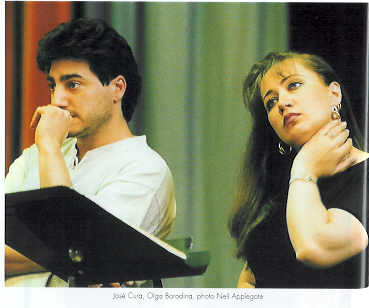Reviews of Samson & Dalila, Chicago
Lyric Opera 2003-2004
Chicago Tribune's John von Rhein (December 15, 2003):
Cura certainly looked the part of the brawny Samson and, once past the hectoring tone with which he oversang the hero's opening scene, the Argentine tenor mustered the heroic timbre and dramatic declamation needed to get him through this demanding French tenor role. He aptly conveyed Samson's Tannhauser-like struggle between faith and the flesh. His most intense and poignant singing came in "Vois ma misere," when the blinded, shackled captive despairingly cried out to God. At quieter dynamic levels, however, the music needed more elegance and a smoother legato line.
CHICAGO SUN-TIMES' WYNNE DELACOMA (December 15, 2003):
Cura, the tall, dark, handsome Argentine tenor who made his American debut at Lyric in "Fedora" in 1994-95, has been on everybody's list of the longed-for "Fourth Tenor" since emerging on stage in the early 1990s. Mercifully, the sillier aspects of that near-desperate early hype have died down a little, allowing Cura's phenomenally rich, flexible tenor voice and stage presence time and space to blossom naturally. Nine seasons ago, Cura arrived at Lyric with a beautiful voice and woeful acting skills. Saturday night, paired with the equally gifted Russian-born Borodina in her Lyric debut as the Philistine femme fatale, he was, both vocally and in terms of acting, the kind of sexy, noble Biblical warrior opera lovers dream about.
With Cura exploiting his tenor's darker weight, Samson emerged as both a thoughtful servant of God and a headstrong warrior. A sexy-looking hunk in his short tunic, he was a magnetic figure in the opening scene, a natural leader whose stirring call to arms galvanized the dispirited Jews. Eschewing cartoonish strutting and gestures for more understated intensity, Cura's Samson was a believable young hero from his first entrance.
That intensity turned the Act II love scene into a titanic struggle worthy of both its Biblical authors and Saint-Saens' gorgeously crafted score. Cura's Samson was acutely aware of his weakness for Dalila and the danger his liaison posed for his people. But the ultimately disastrous clash of his passion with the savvily deployed tears, caresses and curses of Borodina's irresistible Dalila was as riveting to watch as an impending train wreck.
Borodina sounded underpowered at one or two points in Act II, but for most of the evening her ringing mezzo-soprano with its seductively dusky lower register was as magical as Cura's tenor. This is one of Borodina"s signature roles, and her Dalila was as proudly aware as any Scarlett O'Hara of her own beauty and power over men. She manipulated them with the dispassionate skill of a veteran battlefield general.
The Green Bay News-Chronicle's Erik Eriksson (January 2, 2004):
The Samson, Argentinean tenor Jose Cura, began roughly, the tone in his upper middle voice curdling to a near yodel. Bottom and top registers sounded intact, but this unsteadiness around the "passaggio" is unsettling from one who just six years ago offered a suave, smooth integration of registers and a trim, thrilling vibrato. Notwithstanding this problem (one we hope he will address with a first-class vocal pedagogue), Cura was a powerful, subtle, ultimately profoundly moving leader of the Israelites. He has the volume, the dark good looks, the sense of stagecraft and the massive physique of a body-builder.
After ranting a bit in the first act, he settled down to singing of nuance and purpose. In the first scene of the final act, pushing a millstone, he made Samson's anguish heartbreaking and he lifted himself in the temple scene to the final note that brings down the house - literally. A noble, courageous portrayal.
THE NEW YORK TIMES (March 4, 2005)
'SAMSON ET DALILA' The portrayal of Samson by the Argentine tenor José Cura is the main reason to see the Metropolitan Opera's revival of its 1998 production by Elijah Moshinsky. Mr. Cura had not been back to the Met since his 1999 debut, and in the years since he has maximized his strengths and minimized his shortcomings as a singer. Though purists will still fault his vocal rawness and sometimes rough legato, he gives his all in this role, singing with passion, burnished sound, fearless attack and energy. And with his hunky physique and bold physicality, he commands the stage. Though the mezzo-soprano Denyce Graves is a gorgeous and alluring Dalila, and her rich and warm voice is ideal for the role, her singing on opening nights was sometimes shaky and insecure. Bertrand de Billy was the impressive conductor. Tomorrow at 1:30 p.m., Metropolitan Opera House, Lincoln Center, (212) 362-6000. Sold out; returned tickets may be available before the performance. TOMMASINI

